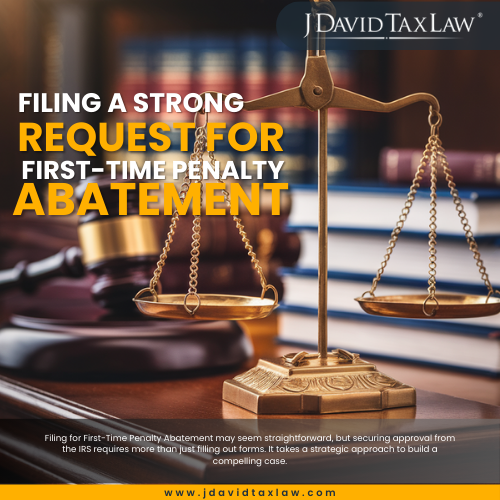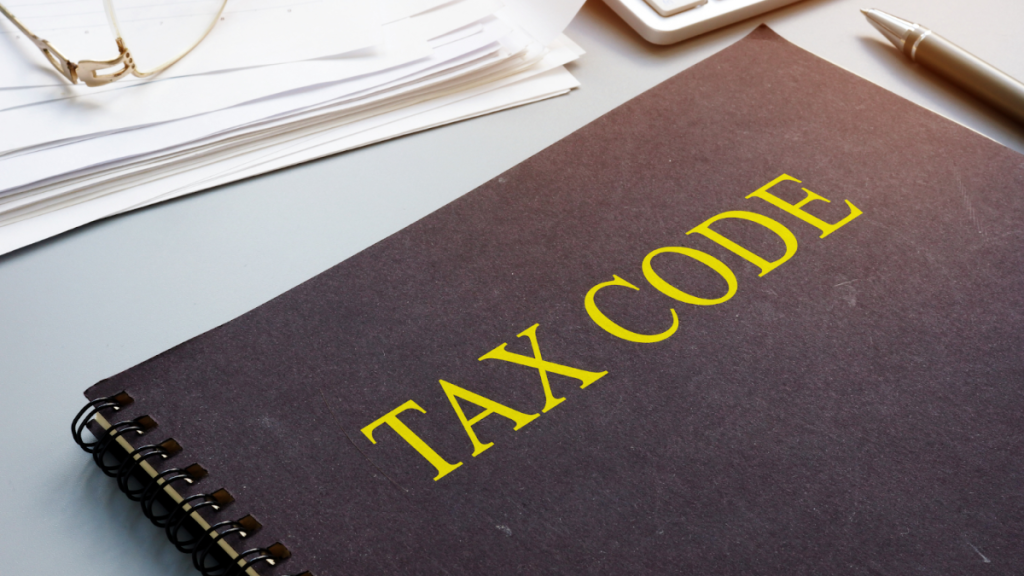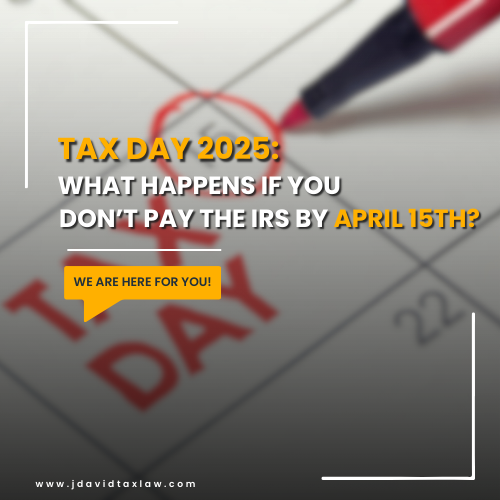Filing for First-Time Penalty Abatement may seem straightforward, but securing approval from the IRS requires more than just filling out forms. It takes a strategic approach to build a compelling case. A skilled tax attorney ensures every detail is handled, every requirement is met, and your chances for success are maximized. Wondering how a tax attorney can create a strong request for your penalty abatement? Here’s how expert representation makes all the difference.
Understanding IRS First-Time Penalty Abatement (FTA) Program
The IRS First-Time Penalty Abatement (FTA) Program is an initiative designed to provide penalty relief for taxpayers who have a clean compliance history but encounter a one-time issue with their taxes. The program allows eligible individuals and businesses to request the removal or reduction of penalties such as failure-to-file, failure-to-pay, or failure-to-deposit.
The primary purpose of this abatement is to offer a fresh start to compliant taxpayers, helping them avoid the financial burden of penalties and maintain good standing with the IRS. It encourages continued compliance by offering relief when taxpayers experience unexpected circumstances that prevent them from meeting their tax obligations on time.
Curious about First-Time Penalty Abatement? Click here to read more about its benefits.
Why you need a Tax Attorney for First Time Abatement
Securing IRS First-Time abatement of penalties can be challenging due to the IRS’s strict eligibility requirements and the complexities involved in demonstrating compliance. Without a solid understanding of tax regulations, even a minor error can result in your request being delayed or denied. The IRS requires a clean compliance history, accurate reporting, and all necessary documentation to be in place.
Having a tax attorney ensures that these details are managed correctly, increasing your chances of a successful abatement. At J. David Tax Law, our expert tax attorneys bring forty years of collective experience to ensure every aspect of your IRS abatement request is handled professionally, giving you the best possible outcome.
The Strategies for Filing a Strong Abatement Request
From accurately assessing your eligibility to crafting a compelling case, the right strategies can significantly improve your chances of reducing or eliminating IRS penalties. Let’s learn about the key strategies that can help build a strong abatement request, giving you the best possible outcome.
Reviewing Eligibility for IRS First-Time Penalty Abatement
The first step in filing a strong IRS First-Time Penalty Abatement request is conducting a thorough eligibility review. A tax attorney will carefully examine your compliance history, ensuring you meet the IRS’s strict requirements. This includes confirming that you have filed all required returns, paid or arranged to pay any outstanding taxes, and have not received a penalty abatement from the IRS in the past three years. By verifying these details, the tax attorney ensures your request has a solid foundation and qualifies under the First-Time Penalty Abatement Program, maximizing your chances for a successful outcome.
Gathering Key Documents for IRS Abatement
An essential part of securing IRS First-Time Penalty Abatement is gathering the right documentation to support your request. A tax attorney will compile important records, including previous tax returns, proof of tax payments (such as IRS Form 1040), and any IRS notices or correspondence related to the penalties. Additionally, documents like IRS Form 843 (Claim for Refund and Request for Abatement) and proof of an IRS-approved payment plan, if applicable, are critical. Having complete and accurate documentation ensures your abatement request is strong and increases the chances of a favorable outcome.
Completing IRS Form 843 Accurately
IRS Form 843 is the official form used to request the abatement of penalties, interest, or other IRS-related fees. For a successful First-Time Abatement, it is essential that this form is completed with absolute accuracy. A tax attorney ensures that every detail is addressed, from filling out the taxpayer’s identification information to specifying the exact type of penalty you are seeking to abate, such as failure-to-file or failure-to-pay penalties.
Additionally, the attorney carefully completes sections of the form that require explanations, such as the reasonable cause for penalty abatement. This section is where your case for penalty reduction is presented—highlighting your clean compliance history and the one-time nature of the error. Supporting documents like IRS notices, tax payment confirmations, and proof of compliance are also attached to further strengthen your request.
By ensuring the form is filled out correctly and all supporting documentation is included, a tax attorney helps prevent delays, rejections, or unnecessary complications, improving your chances for a successful IRS penalty abatement.
Highlighting Compliance History for First Time Abatement
A strong IRS Abatement request relies heavily on demonstrating a clean compliance history. The IRS requires that you have had no significant penalties in the three years prior to the tax year in question. A tax attorney will carefully review and present your compliance history, showing that you have filed all required tax returns and have paid or made arrangements to pay any outstanding tax liabilities.
Highlighting a spotless record of compliance reassures the IRS that the penalty in question was an isolated event, further strengthening your case for abatement. This clean track record is a key factor in demonstrating eligibility for the IRS First-Time Penalty Abatement and positioning your request for approval.
Contact us today for a free consultation and let us review your compliance history to maximize your chances of securing penalty relief
Building a Strong Case for IRS Penalty Relief
To build a strong case for IRS Penalty Relief based on reasonable cause, a tax attorney must present a clear, compelling argument that highlights your unique situation and justifies the IRS abatement request. Unlike simply meeting the basic criteria, building a strong case requires demonstrating that the penalties imposed were caused by reasonable cause and not due to negligence or intentional non-compliance.
An important part of this involves presenting the circumstances that led to the penalties, such as unexpected life events, financial hardship, or other factors beyond your control. The tax attorney will gather supporting evidence—such as medical records, financial statements, or legal documents—that directly tie into the reason for non-compliance. These details strengthen the argument that you acted responsibly but were prevented from meeting your tax obligations due to unforeseen circumstances.
Addressing Tax Obligations Before Filing
Before submitting a First-Time Penalty Abatement request, it’s important to ensure that all outstanding tax obligations are resolved. This includes paying off any unpaid taxes or setting up an installment agreement with the IRS. A tax attorney will review your tax situation to make sure that everything is up-to-date, including filing your income tax returns, managing late payment or late filing issues, and addressing any potential tax penalties.
This step is essential because the IRS will only consider a request for penalty relief if you are compliant with all current obligations. Ensuring your tax history is clean and that there are no outstanding balances significantly increases the likelihood of securing penalty relief.
Managing IRS Communication for Abatement
Effective communication with the IRS is key to a successful First-Time Penalty Abatement request. Once your case is filed, a tax attorney will take charge of managing all correspondence with the IRS, ensuring that your abatement request is properly tracked and any follow-up inquiries from the IRS are promptly addressed.
By managing communications directly with the IRS, the tax debt attorney prevents any miscommunication or delays in processing. Whether it’s responding to IRS notices, providing additional information, or resolving any issues that may arise during the review, professional handling of these interactions ensures the process moves forward smoothly. This allows you to focus on your financial recovery while the attorney works diligently to secure the penalty relief you deserve.
With our expertise in representing tax debt cases across 50 states, we take charge of all IRS communication, ensuring nothing falls through the cracks. Call us at (888) 342-9436 to secure your First-Time Penalty Abatement
Your Tax Relief Questions, Answered















